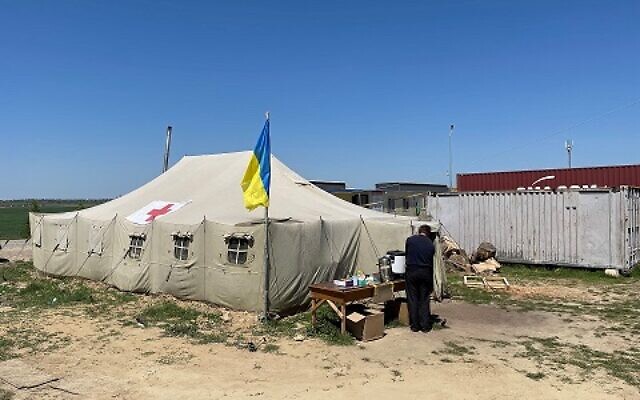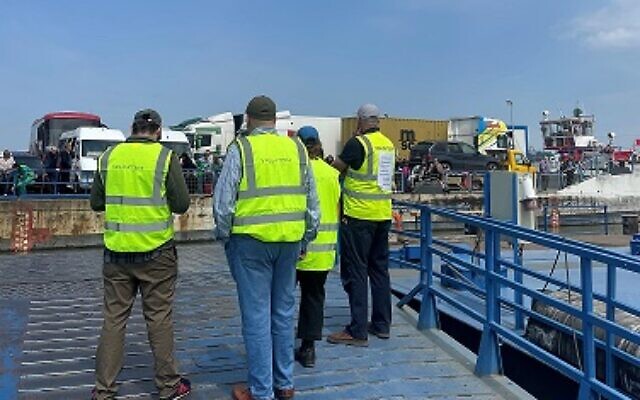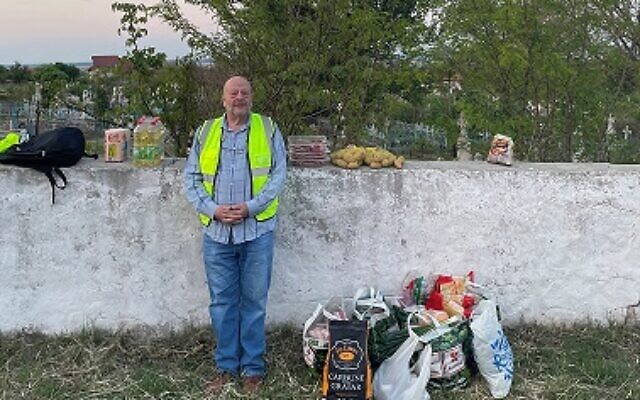Shmerling Volunteers on Ukrainian Border
Brian Shmerling applied his passion for Tikkun Olam by aiding refugees on the Romanian border. Other chefs were amused that his menu consisted of fried chicken wings, borscht and chicken with noodles.
After 37 years with the Atlanta Journal-Constitution and now with the AJT, , Jaffe’s focus is lifestyle, art, dining, fashion, and community events with emphasis on Jewish movers and shakers.

Growing up in a Jewish household and attending the Epstein School, Brian Shmerling was instilled with values to make the world a better place.
He stated, “One of my favorite Jewish traditions is the Passover Seder and its role in making the Jewish community aware of and advocating for oppressed or displaced people regardless of how different that marginalized community may be.”
After graduating from the University of Pennsylvania (Modern Diplomatic History) and Temple Law School, Shmerling teamed up with an attorney co-worker and girlfriend Anita Davidson and her father Stuart, who, while in Israel, met Gabi Chifu, from the general directorate of social assistance and child protection from the Romanian Ministry of Labor, Family, Social Protection and the Elderly, who also joined the group to handle logistics.

In May the group flew to Bucharest, Romania and drove four hours to Isaccea, on the Ukrainian border. They stayed at a small hotel, located within a five-minute walk to the border crossing. Shmerling recounted, “Most people fleeing Odessa traveled across the Danube by ferry into Isaccea. There was a way to leave south-western Ukraine by land, but that required passing through Moldova, which is friendlier to Russian ambitions; and therefore, most refugees decided to cross at Isaccea.” A single ferry-barge went back and forth to and from Ukraine 24-hours a day.
After five days in Isaccea, Shmerling witnessed some Ukrainians leaving to head back home. “I can’t speak to what their decision process was in leaving Romania, presumably they would rather be in their homeland or had determined that Romania didn’t have what they were looking for,” he said. “It was more likely that those returning were situated better economically, and many had cars.”

Shmerling described the refugee camp as a large intake area with picnic tables, cots and play areas all meant to be a temporary stop for refugees. No one was there for more than one night. The volunteers arranged transportation for them. There was a food cart, veterinary services, clothing, toy distribution and an outdoor kitchen run by World Central Kitchen. Free food was available for volunteers, border agents and refugees from sun-up to sundown through WCK. Shmerling carried luggage, played soccer with kids, transported and cooked for the refugees at the WCK.
He said, “One day we bought enough food to feed 200 people. With Chifu’s insistence, we made fried chicken wings, French fries, borscht, and chicken stew with noodles. The other chefs thought it was amusing that Americans showed up and made fried chicken.”
One day Shmerling ventured across the border to observe conditions in the nearest large city on the Ukrainian side, Izmail. “The process for entering Ukraine was fairly easy,” he said.

There he met an American Baptist whose Ukrainian wife was Jewish. The man spoke of a small but dedicated Jewish community that survived the Holocaust and remained in Odessa, and also told us that the Odessa region of Ukraine had used Russian as their primary language since the Communist times. Although since the beginning of the war with Russia, citizens of Odessa relearned Ukrainian instead of Russian as a way of reforming their personal and national identities.
Shmerling explained that not everyone had good intentions. “When the refugee center was initially set up, refugees were inundated by press and organizations trying to photograph people in their most vulnerable states,” he recalled. “While some were sincere news outlets, many organizations were trying to get videos of helpless people to use for their own fundraising, while providing no help or assistance to the refugees at all. Refugees who were already in a severely emotional state, were being harassed. Thus, the people running the center put strict limits on what and where they could film or photograph. There were also widespread reports of Russian spies going to camps gathering information on refugees and volunteers.”
“The primary motivation for this trip came from our personal history of having family that emigrated from Eastern Europe and Russia, due to governmental and social discrimination and oppression against Jews,” Shmerling concluded. “We all had some connection to the struggles that Ukrainians are facing due to geographically being in the way of the militaristic ambitions of a totalitarian nation.”
For information on to get involved and assist refugee intake and transportation resources go to: http://youhub-association.ro.
- News
- World
- Marcia Caller Jaffe
- Ukraine
- russia
- Putin
- Zelensky
- Epstein School
- Passover
- Seder
- University of Pennsylvania
- Temple Law School
- Anita Davidson
- Stuart Davidson
- Gabi Chifu
- Romanian Ministry of Labour
- Family
- Social Protection and Elderly
- Bucharest
- Romania
- Odessa
- Danube
- Isaccea
- Moldova
- Refugees
- World Central Kitchen
- holocaust



comments